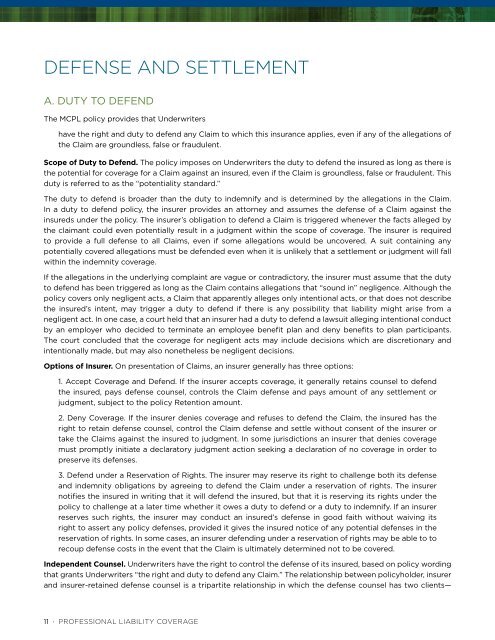Create successful ePaper yourself
Turn your PDF publications into a flip-book with our unique Google optimized e-Paper software.
DEFENSE AND SETTLEMENT<br />
A. DUTY TO DEFEND<br />
The MCPL policy provides that Underwriters<br />
have the right and duty to defend any Claim to which this insurance applies, even if any of the allegations of<br />
the Claim are groundless, false or fraudulent.<br />
Scope of Duty to Defend. The policy imposes on Underwriters the duty to defend the insured as long as there is<br />
the potential for coverage for a Claim against an insured, even if the Claim is groundless, false or fraudulent. This<br />
duty is referred to as the “potentiality standard.”<br />
The duty to defend is broader than the duty to indemnify and is determined by the allegations in the Claim.<br />
In a duty to defend policy, the insurer provides an attorney and assumes the defense of a Claim against the<br />
insureds under the policy. The insurer’s obligation to defend a Claim is triggered whenever the facts alleged by<br />
the claimant could even potentially result in a judgment within the scope of coverage. The insurer is required<br />
to provide a full defense to all Claims, even if some allegations would be uncovered. A suit containing any<br />
potentially covered allegations must be defended even when it is unlikely that a settlement or judgment will fall<br />
within the indemnity coverage.<br />
If the allegations in the underlying complaint are vague or contradictory, the insurer must assume that the duty<br />
to defend has been triggered as long as the Claim contains allegations that “sound in” negligence. Although the<br />
policy covers only negligent acts, a Claim that apparently alleges only intentional acts, or that does not describe<br />
the insured’s intent, may trigger a duty to defend if there is any possibility that liability might arise from a<br />
negligent act. In one case, a court held that an insurer had a duty to defend a lawsuit alleging intentional conduct<br />
by an employer who decided to terminate an employee benefit plan and deny benefits to plan participants.<br />
The court concluded that the coverage for negligent acts may include decisions which are discretionary and<br />
intentionally made, but may also nonetheless be negligent decisions.<br />
Options of Insurer. On presentation of Claims, an insurer generally has three options:<br />
1. Accept Coverage and Defend. If the insurer accepts coverage, it generally retains counsel to defend<br />
the insured, pays defense counsel, controls the Claim defense and pays amount of any settlement or<br />
judgment, subject to the policy Retention amount.<br />
2. Deny Coverage. If the insurer denies coverage and refuses to defend the Claim, the insured has the<br />
right to retain defense counsel, control the Claim defense and settle without consent of the insurer or<br />
take the Claims against the insured to judgment. In some jurisdictions an insurer that denies coverage<br />
must promptly initiate a declaratory judgment action seeking a declaration of no coverage in order to<br />
preserve its defenses.<br />
3. Defend under a Reservation of Rights. The insurer may reserve its right to challenge both its defense<br />
and indemnity obligations by agreeing to defend the Claim under a reservation of rights. The insurer<br />
notifies the insured in writing that it will defend the insured, but that it is reserving its rights under the<br />
policy to challenge at a later time whether it owes a duty to defend or a duty to indemnify. If an insurer<br />
reserves such rights, the insurer may conduct an insured’s defense in good faith without waiving its<br />
right to assert any policy defenses, provided it gives the insured notice of any potential defenses in the<br />
reservation of rights. In some cases, an insurer defending under a reservation of rights may be able to to<br />
recoup defense costs in the event that the Claim is ultimately determined not to be covered.<br />
Independent Counsel. Underwriters have the right to control the defense of its insured, based on policy wording<br />
that grants Underwriters “the right and duty to defend any Claim.” The relationship between policyholder, insurer<br />
and insurer-retained defense counsel is a tripartite relationship in which the defense counsel has two clients—<br />
11 · PROFESSIONAL LIABILITY COVERAGE



